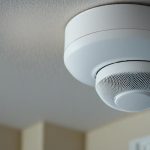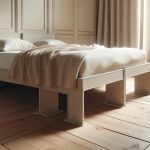Finding the optimal direction for your bed can significantly impact your sleep quality and overall well-being. According to ancient practices like Vastu Shastra and feng shui, the direction your head faces while sleeping can influence your health and energy levels.
If you live in the Northern Hemisphere, it’s best to sleep with your head towards the south. This orientation is believed to improve sleep quality and reduce blood pressure. Conversely, if you’re in the Southern Hemisphere, you should face your head north. Avoid sleeping with your head towards the north in the Northern Hemisphere, as it may cause tension and health issues.
Feng shui principles suggest placing your bed against a solid wall opposite the bedroom door, avoiding direct alignment with the door and windows. This placement is thought to create a sense of security and balance, enhancing your rest.
Key Takeaways:
- In the Northern Hemisphere, sleep with your head facing south for better sleep quality and lower blood pressure.
- In the Southern Hemisphere, sleep with your head facing north.
- Avoid placing your bed in direct alignment with the door or windows.
- Position your bed against a solid wall for a balanced and protected sleeping environment.
By aligning your bed with these guidelines, you can create a more restful and harmonious sleeping space.
Contents
How to position your bed, according to feng shui.
According to feng shui principles, the ideal direction for positioning your bed is based on a combination of the commanding position and your personal energy. The commanding position, where the bed is not directly in line with the door but still allows a view of it, is believed to bring balance and protection while sleeping.
Additionally, your personal energy, determined by your birth date and gender, can also influence the direction that will bring you the most positive energy.
Commanding Position
The commanding position is considered the most important factor in determining the ideal direction for your bed. This position allows you to see the door without being directly in line with it, creating a sense of security and control. This is believed to promote better sleep and overall well-being.

Personal Energy
Your personal energy, determined by your birth date and gender, can also play a role in determining the ideal direction for your bed. Based on feng shui principles, certain directions are more beneficial for different energies. For example, those with a west-facing energy should sleep towards the east for improved health and memory, while those with a south-facing energy may benefit from facing south for wealth and abundance.
Avoid Mirrors
In feng shui, it is believed that mirrors should never face the bed or doorway as they can create a sense of restlessness and negatively affect one’s energy while sleeping. Instead, it is recommended to place mirrors perpendicular or alongside these elements.
Solid Wall Behind Headboard
Having a solid wall behind the headboard is important for support and stability while sleeping. It is also believed that placing the bed on the other side of a toilet wall can have negative effects on one’s energy.
Avoid Beams and Soffits Above the Bed
Beams, soffits, or sloped ceilings above the bed should be avoided or covered with fabric to lessen their impact. These structures are believed to create a sense of pressure and can disrupt the flow of energy while sleeping.
Why does it matter, anyway?
The direction your bed faces matters significantly for home improvement and decorating due to its profound impact on the room’s energy and overall atmosphere. Here’s why:
A key element is feng shui, an ancient Chinese practice focusing on energy flow within a space. Proper bed placement can harness positive energy, promoting relaxation and well-being.
- Positive Energy and Relaxation: Facing your bed in the right direction can enhance the flow of positive energy (chi) in your bedroom. For instance, positioning the bed towards the southeast can aid those struggling with communication issues, while the southwest direction fosters a tranquil environment.
- Negative Energy and Restlessness: Conversely, an improper bed direction can invite negative energy, resulting in restlessness and tension. A south-facing bed is particularly intense, potentially leading to frequent arguments and a hostile environment.
- Balance and Harmony: Feng shui principles suggest avoiding specific directions to maintain balance and harmony. A carefully chosen bed direction can contribute to a balanced and serene home, enhancing both your physical space and mental state.
What if I have a small bedroom and can’t set up my bed this way?
In a small bedroom, arranging your bed can be a puzzle, especially if traditional placements are off the table. Here are practical solutions for arranging your bed when space constraints and fixed elements come into play:
| Placement Option | Description | Benefits |
| Off-Centered Bed | Place bed off-center against a wall | Balanced look, more space for furniture |
| Under the Window | Place bed under a window, use curtains and shelves | Utilizes space, adds decor elements |
| Against a Wall | Bed against one wall, good for daybeds | Maximizes floor space, easy access |
| Diagonal Placement | Bed placed diagonally in a corner | Unique focal point, better fit for some layouts |
These strategies allow you to make the most of your space, ensuring your bedroom remains functional and inviting.
Other feng shui tips to consider in your bedroom.
When arranging furniture in your bedroom, it’s not just about aesthetics but also about creating a harmonious and balanced environment that promotes relaxation and rejuvenation. Here are some essential feng shui tips to consider:
| Tip | Description | Reason |
| Avoid Clutter | Keep the bedroom free of clutter, especially under the bed. | Clutter disrupts energy flow, leading to restlessness and anxiety. |
| Symmetry | Place nightstands on both sides of the bed. | Creates balance and supports harmonious relationships. |
| Solid Headboard | Use a solid headboard attached to the bed. | Provides stability and supports mental well-being. |
| Mirrors | Avoid placing mirrors directly opposite the bed. | Mirrors can reflect energy, causing disturbances in sleep. |
| Natural Elements | Incorporate plants, but avoid placing them too close to the bed. | Plants enhance the flow of positive energy but can be too stimulating if too close. |
| Soft Lighting | Use soft, adjustable lighting. | Promotes a calming atmosphere conducive to rest. |
| Electronics | Minimize the presence of electronic devices. | Electronics can disrupt sleep and the flow of energy. |
| Art and Decor | Choose artwork that evokes tranquility and happiness. | Positive imagery fosters a peaceful and inviting space. |
| Colour Scheme | Opt for soothing colours like soft blues, greens, and neutrals. | Calming colours create a restful environment. |
| Bedside Table Placement | Ensure that bedside tables are at the same height as the mattress. | This placement supports the energy flow and is practical. |
Applying these feng shui principles when arranging your bedroom furniture not only improves the room’s visual appeal but also enhances the quality of your sleep and overall well-being.
A recap of how to feng shui your bed.
| Step | Description | Why it’s Important |
| Commanding Position | Place your bed so you can see the bedroom door without being directly in line with it. | This positioning gives a sense of security and control, leading to a more restful sleep. |
| Avoid Direct Alignment with Door | Ensure the bed is not directly aligned with the door to avoid disruptive energy flows. | Reduces disturbances and promotes a more tranquil sleep environment. |
| Use a Mirror | If you cannot see the door from the bed, use a mirror to reflect the door while avoiding reflections of the bed. | Maintains the benefits of the commanding position without compromising privacy. |
| Diagonally Opposite Door | Ideally, place your bed diagonally from the door. | This maximises control over the room and enhances relaxation. |
| Avoid Beams, Soffits, or Sloped Ceilings | Do not place your bed under architectural features that can create oppressive energy. | Prevents feelings of pressure and discomfort, fostering better sleep quality. |
| South-Facing for Wealth | Place the bed facing south if possible, but not at the expense of the commanding position. | This direction is believed to foster wealth and prosperity. |
| Avoid Reflecting Mirrors | Ensure mirrors do not reflect you while in bed or face the doorway. | This prevents the depletion of personal energy and avoids negative impacts on sleep. |
| Accessible on Both Sides | Ensure both sides of the bed are accessible and not against a wall. | Promotes balanced energy and harmony in relationships. |
Conclusion
Finding the optimal direction for your bed can significantly enhance your sleep quality and overall well-being. Ancient practices like Vastu Shastra and feng shui emphasize the importance of bed orientation to influence health and energy levels. For those in the Northern Hemisphere, placing your head towards the south is recommended to improve sleep and reduce blood pressure. Conversely, in the Southern Hemisphere, your head should face north to align with the Earth’s magnetic field.
Feng shui principles also advocate positioning your bed against a solid wall, opposite the bedroom door but not directly in line with it, to create a sense of security and balance. Avoid placing your bed under windows or beams, as these can disrupt the flow of energy and lead to restlessness.
Incorporating these guidelines can transform your bedroom into a restful haven. Whether adjusting for hemispheric differences or adhering to feng shui, aligning your bed properly promotes a harmonious and rejuvenating sleep environment.





